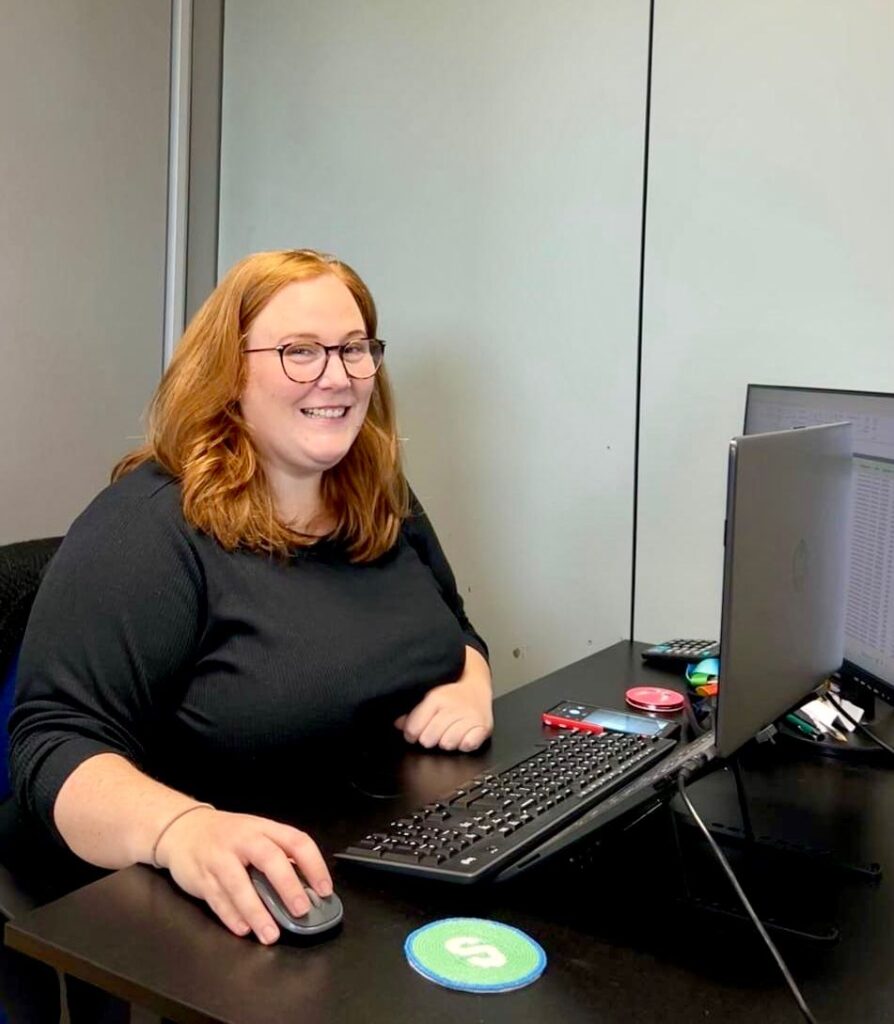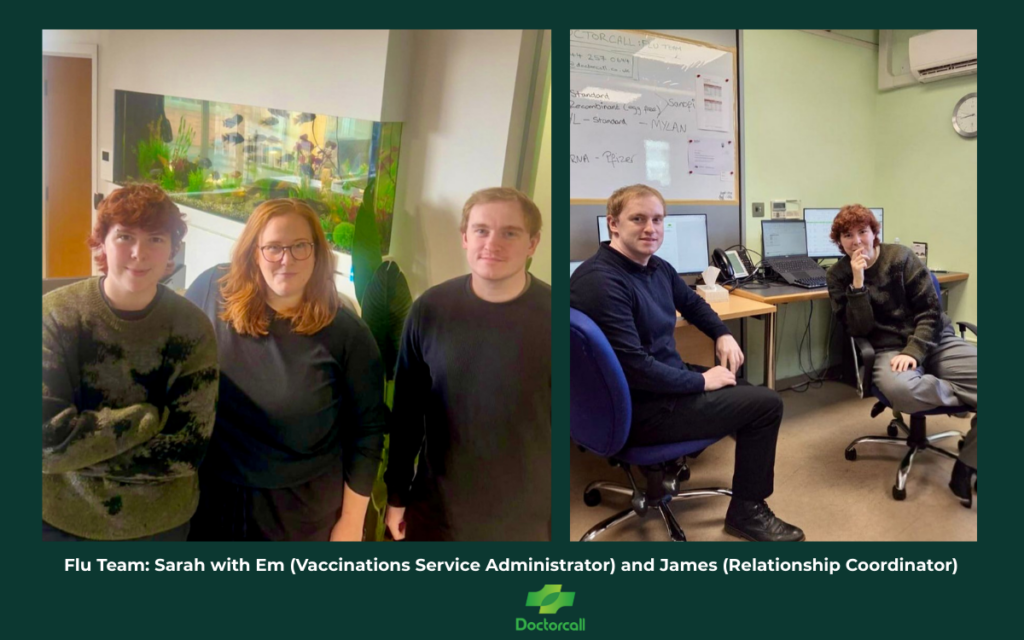The most effective workplace health interventions are routine, consistent, and built into the working day. Doctorcall brings a flu clinic to you, or offers vouchers redeemable at partner pharmacies, so protecting your staff is easy and efficient.
For companies new to the idea, a Doctorcall flu clinic is a pop-up clinic set up in a private room at your workplace on a day of your choosing, with timed appointments so people are back at work within minutes.
The results we provide are measurable, with fewer absences through the winter.
The set up of a Doctorcall clinic is deliberately light. Reserve your dates, confirm numbers and circulate your booking link. We provide the vaccines, equipment, qualified nurses, clinical governance, cold chain and waste disposal.
To help uptake, we also supply ready-to-use posters, staff emails and social assets, and a dedicated team is on hand to answer all your questions.
Here is how Doctorcall delivers it, and the people who make it work!
A Conversation With Sarah Johnson, Vaccination Services Manager, Doctorcall
At 7 in the morning in Manchester, the check-in texts to nurses are already going out. By 9 am the day is in full flow, with schedules confirmed, deliveries landing, and clinics making final adjustments.
It looks calm on site because a small team has been working for months behind the scenes.
At the centre is Sarah Johnson, who leads Doctorcall’s workplace flu vaccination programme.

Now in her seventh year (or ‘flu season’), Sarah started in a smaller team with Jamie, the Operations Manager, learnt every moving part, and today runs the operation with support from her team, a dedicated warehouse and a big network of experienced nurses.
Planning Starts While the Current Flu Season Is Still Underway
“Flu season for us runs from September through to Christmas,” Sarah begins. “But the work starts much earlier. While one season is in full swing, we are already noting things for the next one. What worked well and what we need to improve.”
January and February are for a structured review with the whole team. They look at outcomes and feedback from clients, nurses and the warehouse: attendance rates, reschedules, and any incidents, with a clear focus on tightening processes and repeating what works.
“We ask what went well and why, and what we can improve and how,” Sarah says. “The aim is a smoother season each year.”
Where the Work Begins: Clients First, Then Numbers
By Easter, the work starts looking forward. Returning clients get first contact so they can hold onsite clinic dates.
“We start with returning clients as they have first shout at securing the same dates for the next season’s clinics,” Sarah says. “We get them booked in early. Sometimes they contact us first, but either way that is the priority.”
Once those dates are pencilled in, the team turns to the numbers: how many vaccinations were delivered last year and what volume to expect this year. Confirming with vaccine suppliers by the end of May secures guaranteed supply.
“That is when we place vaccine orders to match our projections. It is gradual, but spring is when the engine starts.”
Two Clear Options for Clients: On-Site Clinics and Vouchers
Doctorcall workplace flu vaccination programme runs on two tracks so organisations can choose what fits them best.
Flu Vouchers:
“Vouchers need their own plan,” Sarah explains. “We review our pharmacy network across the UK, including remote areas and Northern Ireland. We confirm who is staying on and look for gaps. If a postcode looks thin, we onboard more pharmacies so people always have a nearby option. Our footprint is huge, and we’re always growing.” Pharmacies usually receive stock from late September into October. “We advise people to use vouchers early, ideally in October, as December is very busy with NHS demand.”
On-site clinics:
“We look at how many nurses we required, where they were based, and how they performed. Strong client feedback means we retain and prioritise those nurses. Availability matters, but so does experience. We want good people who give a good clinic.”
The People Who Deliver It
Selecting nurses:
Nurses must hold basic life support and anaphylaxis training. “If someone has a reaction, they need to know exactly what to do.”
Beyond certificates, Sarah looks for warmth and steadiness. “They are the face of Doctorcall on the day. A calm manner helps nervous people more than anything.”
Safeguarding:
For clinics in schools or settings with vulnerable groups, the programme uses Enhanced DBS checks as standard. This level of scrutiny will show spent and unspent convictions and relevant local police information, plus checks against the barred lists where needed.
“Clients should feel sure we are sending safe, trusted professionals,” Sarah says.
Directly contracted nurses, not agency:
“We use our own nurses in the vast majority of cases rather than rely only on agencies,” she adds. “It gives consistency, tighter training, and clear accountability. It also makes scheduling more reliable as we have direct daily contact with our own nurses. People see the same high standard wherever they are.”
Some nurses have become familiar faces. “We are in Manchester, so locals sometimes drop by after a nearby clinic. One brings Christmas biscuits each year! After years together you build trust. That is priceless when you need a favour.”
Sarah’s Path Into the Role
“I started out alongside Jamie when the team was small,” she says. “We shared the load and I learnt across different areas. Over time I took on more of the operational side and the responsibility for flu team became mine.”
“This is my seventh season. It was overwhelming at first. Long hours and constant coordination. Each year I have grown more confident. The team has grown too. Em looks after logistics, James looks after clients, and we can ask for help from other parts of the business if needed.”
What keeps her in it? “The mix of challenge and care,” she says. “You plan well and you look after people.”

A Day in Peak Season
By September the programme is in full swing. Roles are clear, and everyone is ready to jump in. The busiest period blends new bookings, live clinics, schedule refinements and voucher orders, all tracked and coordinated centrally.
Early morning:
From 7.00 the team checks in with every nurse scheduled that day and confirms deliveries. These proactive touchpoints keep clinics on time and ready to start.
On the day:
There is no separate on-site coordination team. “The nurse is our representative,” Sarah explains. Doctorcall helps companies manage flow with an online appointment system so staff arrive in timed slots. “That avoids queues and keeps the day orderly, minimising time away from work.”
Companies also receive a confirmation document once a booking is agreed. It sets out all the requirements, the space needed, likely throughput, timings, and what to do with equipment and the clinic box at the end.
“Everything is written down so the day runs well!”
Why Booking Early Helps?
“As early as possible,” Sarah says, “helps you secure ideal dates and lets us assign the right nurse in good time, and we often run offers at the start of the year.
If your timeline is tighter, we will still build around it with a mix of clinics and vouchers.”
The programme is UK-wide, including Northern Ireland. Remote areas are mapped so voucher coverage is in place wherever clinics are not practical.
“It is about making it easy for people to get protected.”
Why It Matters
What Doctorcall provides is preventive. “Flu can put you in bed, and in the most severe cases, hospital, and take you out of action for days,” Sarah says.
“I am proud that we help reduce that.” She pauses. “And it is a team effort. Em, James, the warehouse and our nurses. Everyone has an important role in delivering a seamless service.”
Her promise is steady and simple: “We will plan well, and we will look after your people, whatever your timeline.”
The best time to book a flu clinic is now!
📞 Call our Flu Team on 0344 257 0644 to book your clinic or contact us here.
💉 Looking for flexible options? Doctorcall Flu Vaccination Vouchers are available from just £9.95 each, perfect for staff who can’t attend on-site.
